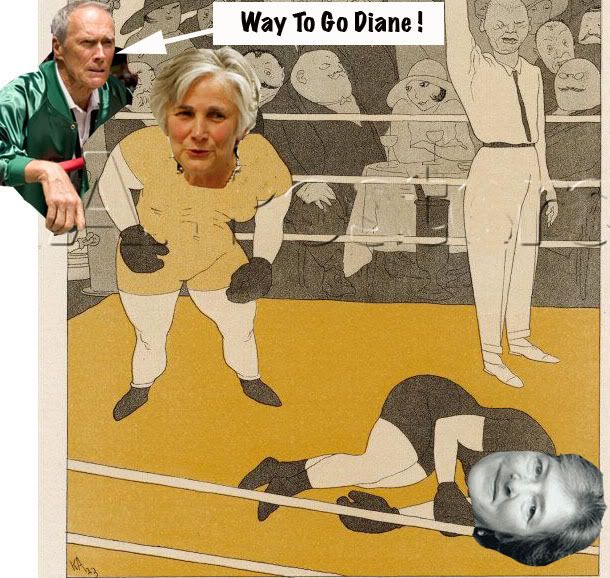
After being sandbagged by the plumbers' at Tweed (click here for the cultural reference). Diane Ravitch slugged back today in an editorial in the nypost. I want to kiss her on the lips
November 1, 2007 -- I HAVE been writing about schooling for 40 years, but have never experienced an attack as intemperate as the one by Kathryn Wylde ("Hypocritical Critic", Post Opinion, Oct. 30).
This attack, I have learned from published accounts, was orchestrated by the New York City Department of Education, which compiled a secret dossier about my views and turned it over to Wylde. I am at the top of the Department's enemies list. This is a frightening way for a public agency to behave.
I am a historian of education. My first book, published in 1974, was a history of the New York City public schools. I served as assistant secretary of Education for research in the first Bush administration and as a member of the National Assessment Governing Board in the Clinton administration. I think I have earned the right to express my views about education.
But Kathryn Wylde, upset that I have offered reasoned criticism of the Department of Education, warns that I am not to be trusted. Any criticism of the current leadership, she suggests, must not be tolerated.
Wylde is outraged that I wrote recently that the bonus deal between the teachers union and the Klein administration is not "merit pay." In fact, it is not merit pay: Merit pay goes only to individuals; the deal produced a schoolwide bonus program.
In each school, a compensation committee will decide how to distribute the bonuses. The committee might give a bonus to every UFT member - including secretaries, paraprofessionals and other non-teachers - or it might award the extra cash on some other basis. This is not merit pay.
Have I changed my views on some policy issues, as she charges? Yes, I have.
I used to think that nothing could be worse than the old Board of Education, but I was wrong. After two top-to-bottom reorganizations of the school system in four years, I have come to see that there is a virtue in stability, especially for schools, which are communities.
Furthermore, having seen how volatile and manipulable the state tests are, I have become skeptical of using such poor measures for punishing or rewarding teachers, students or principals.
Have I abandoned my belief that all children deserve a great education? Absolutely not. Indeed, I am appalled that schooling in this city has degenerated into little more than testing and preparing for more testing. This is decidedly not great education!
A great education is one that includes history, literature, the arts, physical education, science, mathematics and foreign language. The leadership of the Department of Education has no educational vision.
Wylde claims that I have withdrawn my support for high standards because I cast doubt on the Klein administration's claims of improved test scores. The federal assessments, generally considered the gold standard of testing, have shown no significant gains for New York City students since 2003. I seek candor and transparency, not lower standards.
More troubling to me than the personal nature of the attack by Wylde is the likelihood that her article is intended to silence not only me but other independent critics. The message seems obvious: If this can be done to me, it can be done to anyone - particularly independent researchers at local universities that are now receiving grants from the city Department of Education.
The 2002 measure that handed control of the schools to the mayor also eliminated the central Board of Education and the local community school boards. At the time, I supported that legislation. Now, with the benefit of experience, I question the wisdom of eliminating all public forums in which school officials must stand up in public and answer questions. The net effect of these changes leaves the public out of public education.
Wylde - speaking on behalf of the Partnership for New York City, an organization of leaders of major corporations - apparently believes that public engagement is an encumbrance to public education. She implies that the changes now under way, made without any open deliberation, need no public discussion.
I would argue the opposite. The public schools need involvement by parents and local communities. They need a lively and open public forum in which decisions can be debated before they are finalized. The public should have a voice in what happens to the children of the community.
This I promise: I will continue to analyze the facts and the evidence to the best of my ability, without fear or favor. I will not be intimidated. I will not be silenced.






No comments:
Post a Comment